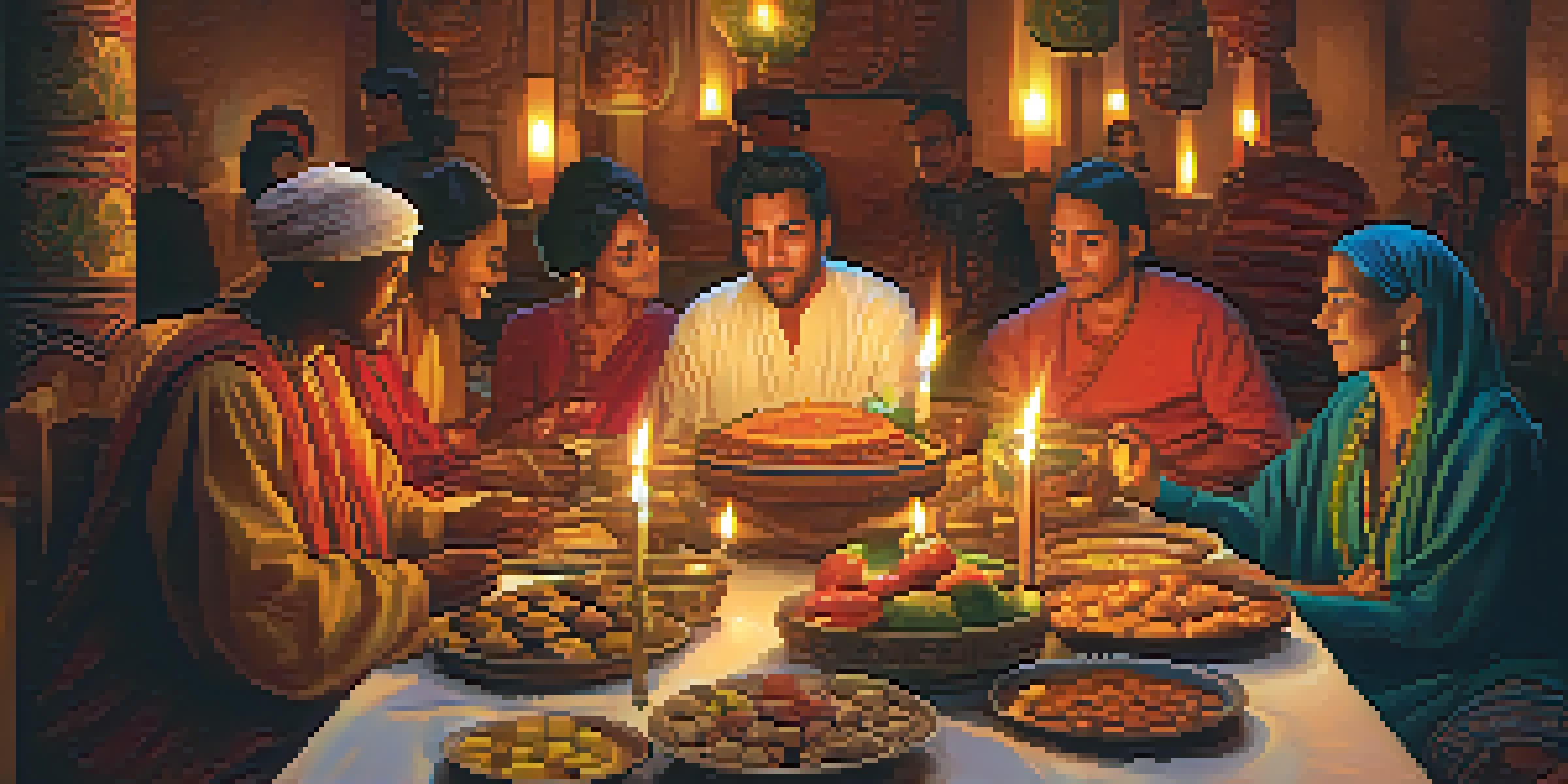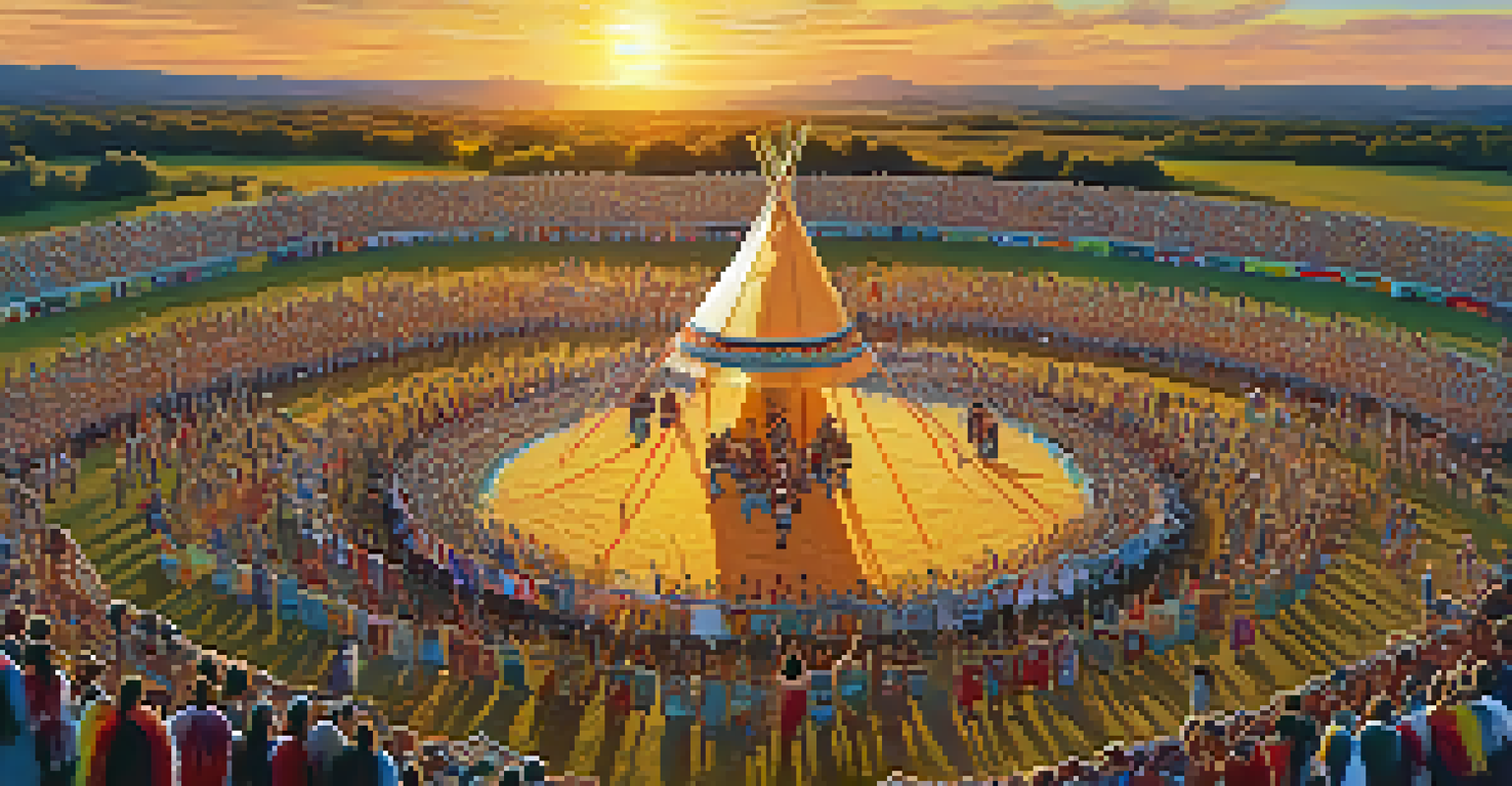Exploring the Role of Rituals in Spiritual Festivals

Understanding Rituals: The Heart of Spiritual Festivals
Rituals are structured activities that hold significance within a community, often rooted in tradition and spirituality. In spiritual festivals, these rituals serve as a bridge connecting participants with their beliefs and each other. They can range from simple prayers to elaborate ceremonies, each designed to evoke a sense of belonging and purpose.
Rituals are the formulas by which harmony is restored.
Take, for example, the lighting of candles during Diwali, which symbolizes the triumph of light over darkness. This act transforms individual participation into a collective experience, reinforcing shared values and cultural identity. Such rituals not only honor traditions but also foster a sense of unity among diverse participants.
Ultimately, rituals help to create a sacred space where individuals can express their spirituality. They provide a framework through which people can engage with their faith, reflect on their values, and celebrate their shared experiences, making festivals vibrant and meaningful.
The Role of Community in Spiritual Rituals
Community plays a vital role in the execution and experience of rituals during spiritual festivals. When individuals come together to participate in these activities, they create a shared sense of identity and belonging. This communal bond strengthens connections among participants, enhancing the overall spiritual experience.

For instance, during the Hajj pilgrimage in Islam, millions gather in Mecca to perform rituals together, reinforcing their faith while fostering a sense of global unity. This collective participation can transform the individual experience of spirituality into something larger, creating a profound sense of community.
Rituals Unite Communities
Rituals create a sense of belonging and shared identity among participants during spiritual festivals.
Moreover, the communal aspect of rituals encourages people to support one another, share stories, and learn from different perspectives. This exchange enriches the festival experience, allowing participants to forge deeper connections not just with each other, but also with their spiritual beliefs.
Rituals as a Means of Cultural Preservation
Rituals serve as a vital link to cultural heritage, preserving traditions that might otherwise fade over time. In spiritual festivals, these practices often reflect historical narratives and cultural values that have been passed down through generations. By engaging in rituals, participants actively contribute to the preservation of their cultural identity.
Rituals are the building blocks of culture and community.
For example, the Native American powwow is a vibrant celebration that incorporates traditional dances, songs, and storytelling, all of which serve to honor ancestral heritage. Each ritualistic element is a reminder of the community's history and beliefs, ensuring that these stories are not lost to time.
Through the repetition of these rituals, communities reinforce their cultural significance, allowing younger generations to connect with their roots. This continuity fosters pride and awareness, making rituals a crucial element in the ongoing narrative of a culture.
The Transformative Power of Rituals
Rituals have a unique ability to transform individuals and communities during spiritual festivals. They create moments of reflection and introspection, prompting participants to connect with their inner selves. This transformation often leads to personal growth and a deeper understanding of one’s beliefs.
Consider the practice of fasting during Ramadan, which encourages self-discipline and spiritual reflection. For many, this ritual not only serves as a means of atonement but also fosters empathy for those in need, ultimately transforming both the individual and the community.
Cultural Heritage Through Rituals
Engaging in rituals helps preserve cultural traditions and values, connecting generations to their heritage.
As participants engage in these transformative experiences, they often emerge with renewed perspectives and strengthened faith. This process of transformation underscores the powerful role rituals play in shaping spiritual journeys during festivals.
Modern Adaptations of Traditional Rituals
As society evolves, so too do the rituals associated with spiritual festivals. Many communities are finding ways to adapt traditional practices to resonate with contemporary values and lifestyles. This evolution ensures that rituals remain relevant and engaging for new generations.
For instance, some festivals have integrated technology, allowing for virtual participation in rituals. This adaptation not only widens accessibility but also fosters a sense of global community, connecting participants from around the world in shared spiritual experiences.
While the essence of these rituals may change, their core purpose remains intact. The ability to adapt ensures that traditions are not lost but rather enriched, allowing for a dynamic and inclusive celebration of spirituality.
The Psychological Benefits of Engaging in Rituals
Engaging in rituals during spiritual festivals can have profound psychological benefits. These practices offer individuals a sense of control and stability, especially during uncertain times. The predictability of rituals can provide comfort and reassurance, helping to alleviate stress and anxiety.
For example, the rhythmic chanting or drumming often found in spiritual ceremonies can induce a meditative state, promoting relaxation and mindfulness. This calming effect can help participants connect with their surroundings and themselves, enhancing their overall well-being.
Rituals Foster Personal Growth
Through reflective practices, rituals promote personal transformation and a deeper understanding of one's beliefs.
Additionally, the social support garnered from participating in community rituals can further bolster mental health. The shared experience fosters a sense of belonging, helping individuals feel more connected and less isolated, which is especially important in today’s fast-paced world.
Conclusion: Embracing the Role of Rituals
In conclusion, rituals play an essential role in spiritual festivals, enriching the experiences of individuals and communities alike. They serve not only as expressions of faith but also as tools for cultural preservation, personal transformation, and psychological well-being. By embracing these practices, participants can cultivate deeper connections with their spirituality and each other.
As we navigate an ever-changing world, the adaptability of rituals ensures their continued relevance in fostering community and shared values. Whether traditional or modern, these practices remind us of the importance of connection, reflection, and celebration in our spiritual journeys.

Ultimately, the power of rituals lies in their ability to bring people together, creating a tapestry of shared experiences that transcend time and space. By exploring and engaging in these rituals, we can deepen our understanding of ourselves and the world around us, enriching our spiritual lives.